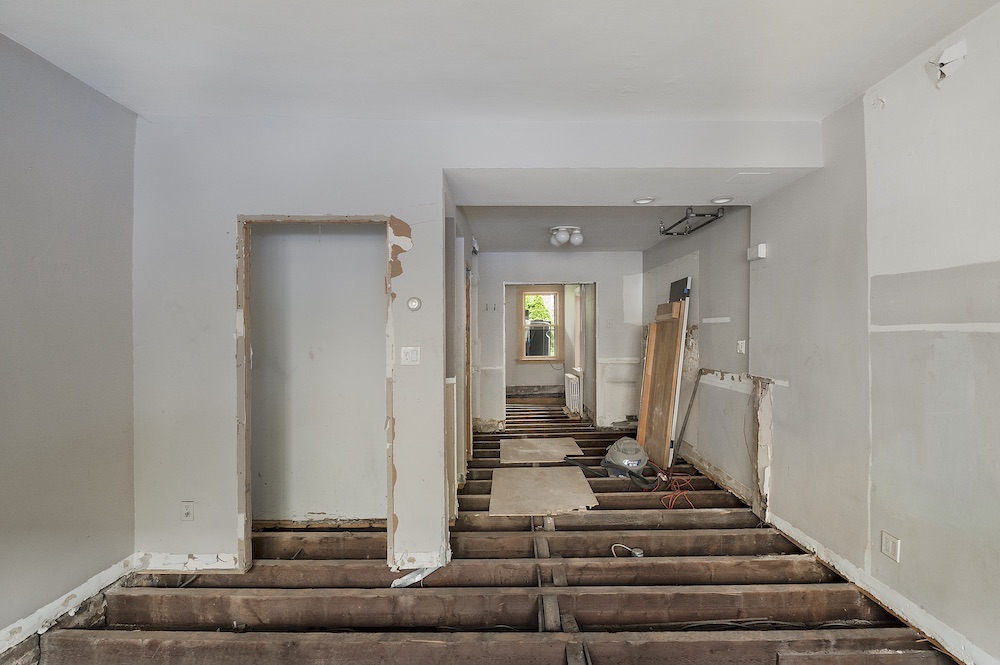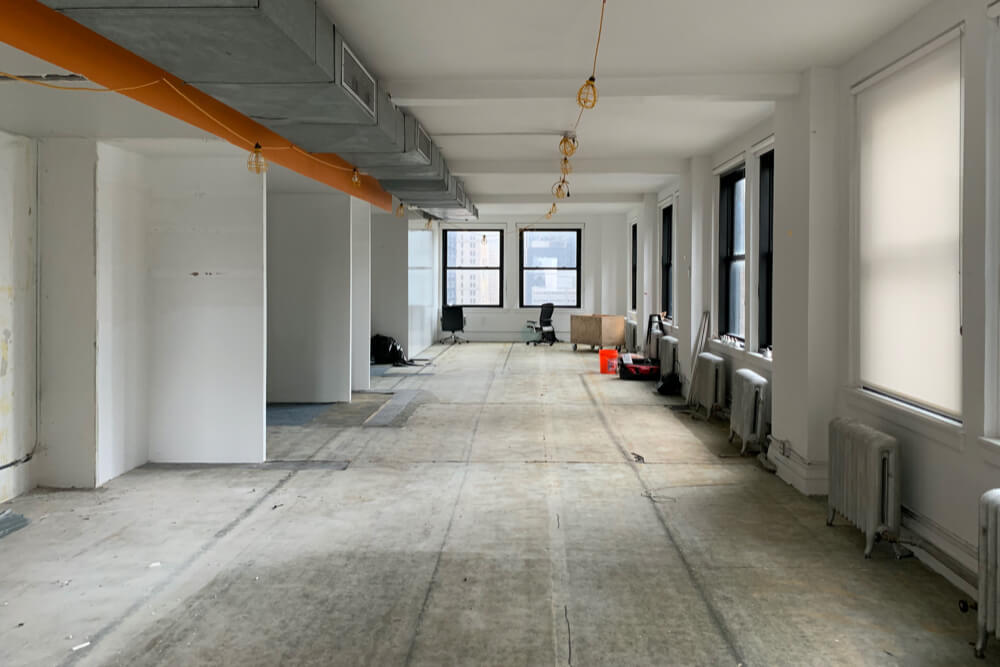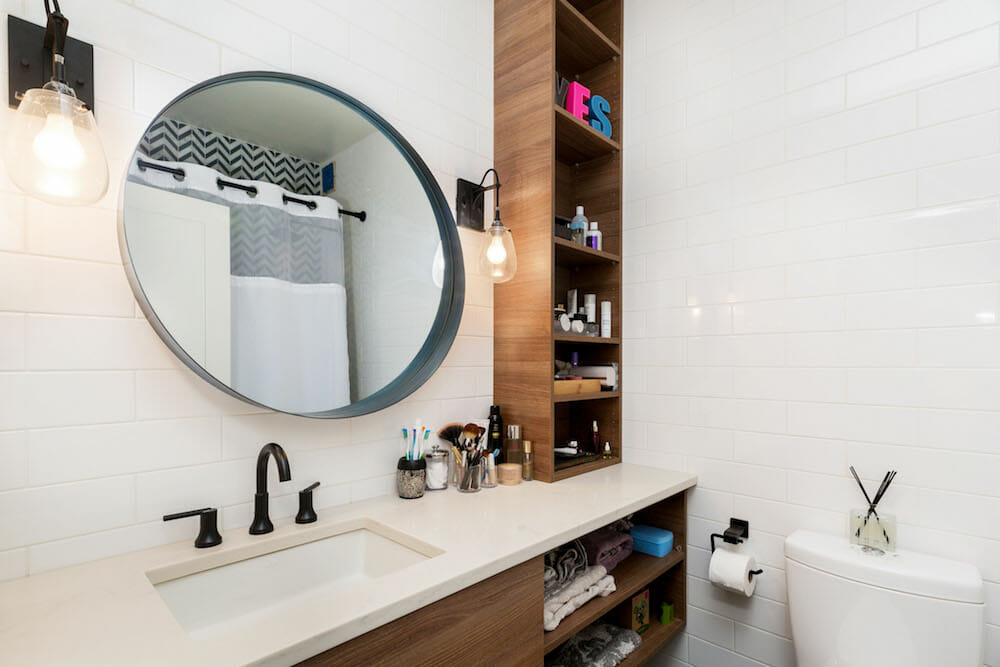How Long Does an Apartment Renovation Take?
A step-by-step guide and timeline for a one-bedroom apartment renovation

Should you renovate in stages or all at once?
We’ve covered the expected timelines for kitchen renovations and bath renovations, but how long does an entire apartment renovation take? Since bathrooms and kitchens are usually the most time-intensive spaces to redo, the timeline for renovating a one-bedroom apartment is not much longer. Another bonus: the more spaces there are, the more opportunity there is to implement economies of scale and to multi-task! This approach allows you to save both time and money.
If you’re considering spacing out several projects (for budgetary reasons), you should consider doing them all at once. While it’s a larger sum upfront, it’ll likely be a better value for your money. For example, while you’re waiting for your cabinets to arrive, your contractor can paint the bedroom or install baseboards. Also, consider the cost– and time–effectiveness in using the permits and crew already scheduled for your project for a full scope rather than securing them multiple times.
General timeframe for a one-bedroom remodel
As always, size and complexity determine how long an entire apartment renovation will take. If you aren’t moving walls or changing electrical or plumbing, your apartment renovation will be on the shorter side. On average, you should allocate about three to five months for on-site work in a top-to-bottom one-bedroom apartment renovation.
Apartment Renovation Timeline: Pre-Construction Phase
While the attention is usually on the most visible construction phase, there is a lot to be done before then. Here are the details on each box you’ll need to check before breaking ground on the project.
STEP 1: Close on your property (1-3 months)
Many homeowners are in-contract or preparing to close on a property when they begin the process of planning a renovation. If this is you, don’t worry: there’s a way to get it all done. You should wait until you have closed on the property, with keys in hand, before doing anything. If you’re in a hurry—wait until you’ve at least signed the contract before beginning the design process.
STEP 2: Post your renovation project on Sweeten (5 minutes)
Once you’re in contract, or if you already own your apartment, you can post your project to Sweeten and begin soliciting bids. Add the details about the space you want to renovate, your inspiration photos (optional but useful for our matchmakers), and any other information that would help us find your perfect contractors. We’ll connect you with 3-5 of our trusted, vetted contractors who are a good fit for your project.
STEP 3: Schedule site visits and solicit bids (1-3 weeks)
Once you’ve previewed the Sweeten contractors’ profiles, and have decided you’d like to set up a meeting(s), our online scheduler will give you a two-week window to mark your available dates for a site visit. Both you and the contractor(s) will receive an email confirming your available times, by which the contractor(s) will reach out to you to confirm a date.
An on-site visit is the best way for a contractor to understand the scope of the project, the physical possibilities, and limitations of the space, and for the two of you to see if you hit it off! (This guide is useful for understanding the key info necessary to secure the most accurate bid.) After you schedule your on-site visit, check out our blog post about how to prepare for the meeting. You should expect a written bid within 5-10 business days after your visit.
STEP 4: Level bids and choose a contractor (1-2 weeks)
Once all the written bids have come in, it’s time to compare and contrast! This primer on leveling bids might come in handy. If you have follow-up questions, now is the time to ask. You can also schedule a call with Sweeten to walk you through the various bids and weigh in on the selection.
STEP 5: Sign the contract and finalize construction schedule (1 week)
Once you’ve decided on a contractor, he or she will put together a contract for you to review. This will typically include a description of the work to be done, an estimated timeline for completion, as well as the timing of payments throughout the project.
STEP 6: Obtain permits and approvals (ranges widely)
Of all the steps where hiccups or delays might occur, this is it. Obtaining the correct permits and board approvals have held up many a renovation, but don’t be daunted: our experts are well-versed in navigating these processes and can advise you on how best to achieve your renovation goals with the least amount of hassle. If you’re moving plumbing or gas lines, you’ll need an architect and additional DOB permits. Sweeten homeowners have reported obtaining approvals in as little as two weeks—but it’s more common for it to take a couple months.
If you live in a stand-alone house, you won’t need to worry about building board approvals, but you’ll still need the requisite city permits for any electrical or plumbing work to make sure that everything is up to code.
STEP 7: Source materials (ranges widely)
If you are responsible for sourcing all or some of the materials in your renovation, be sure to place the orders as soon as the design plan is finished. Certain items have long lead times, and you don’t want that one faucet to hold up the entire renovation. If time is a concern, look at what’s currently in stock and ready to ship. Speak with your contractor about timing the product delivery to coincide with time of installation. Sweeten brings homeowners an exceptional renovation experience by personally matching trusted general contractors to your project, while offering expert guidance and support—at no cost to you. Renovate expertly with Sweeten
STEP 8: Tell your neighbors you’re renovating (15 minutes)
Be a good neighbor and warn yours that a renovation is beginning imminently. Tell them what to expect and how long the project is slated to last. It’s always easier to stomach the disruption when you know there’s an end in sight! It doesn’t hurt to bring some sweets, a bottle of wine, or a gift card for a local coffee shop. When the reno is over, invite them over!
Apartment Renovation Timeline: Construction Phase
While most of the steps under “Construction” are your contractor’s responsibility, it’s important to understand what should be happening when. The most important steps you’ll be in charge of here are making scheduled payments to your contractor (as outlined in your contract), and keeping your schedule open for several hours a week to answer questions about details or changes that come up over the course of construction.
STEP 9: Time for demolition (2-5 days)
Out with the old! Now that you’re done with the paperwork, it’s time for your contractor to pick up that sledgehammer. Be sure to protect the items that are staying with tarp or plastic, and get to work tearing out everything else. Depending on how large your apartment is, and how extensive the renovation, this shouldn’t take more than two to five days.
STEP 10: Reroute plumbing and electrical (2-4 days)
In our national survey, 62% of respondents named finding hidden problems in their home as a top renovation fear. Now that you’ve stripped the space down to the studs, it’ll be easy to get new plumbing or electrical where it needs to go. Consider whether any plans should be altered now, since you’re able to see what’s behind the walls.
STEP 11: City inspections and sign-offs (1-4 days)
If you needed city permits for electrical and/or plumbing work, you’ll need inspections and a sign-off before closing the walls. While a master plumber can typically sign off on pipework for water lines in the case of a no-show by the city inspector, an inspector must examine and approve any work on gas lines. You are not allowed to close up the walls and move onto the next phase of the project until this inspection happens. With electrical work, inspectors generally are scheduled for visits once the project is 100 percent complete, and they will check the electrical panel, junction boxes, and outlets. (Note that sometimes, because of city bureaucracy and delays, your electrical inspection may be rescheduled two or three times.) Check with your contractor or architect about what your project requires.
STEP 12: Floor installation (5-12 days)
To prevent having to redo the floors if you decide to reconfigure your space in the future, make sure that the flooring is consistent throughout, even if some of it will be hidden. After the floors are in, you’ll add new baseboards.
STEP 13: Installation completion (5-20 days)
Install the kitchen, usually in this order: cabinets, appliances, fixtures and lighting, counters, backsplash, and cabinet hardware.
Install the bathroom, including the tub, vanity and sink, toilet, and any built-in shelving. Tiling, lighting, and hardware usually come last.
In the hallways and bedroom, if you are doing basic painting and touch-ups, the work will be fairly minimal compared to the kitchen and bath. If you are adding custom, built-in shelving or paneling, plan to add a few extra days.
Possible delays: aspects of this may vary, depending on site conditions and the arrival time of the materials.
STEP 14: Clean-up (1 day)
Typically, contracts allow that spaces should be left in “broom-swept” condition. However, you may want to hire post-construction cleaning specialists to make sure that your new floor is clean enough to eat off. For a full apartment, plan on requesting at least two cleaners to work at the same time so that it can be finished in one working day.
Apartment Renovation Timeline: Post-Construction Phase
The finish line is in sight! But don’t forget these last—but important—steps.
STEP 15: Final walk-through with the contractor (1-2 hours)
Review the work with your contractor: try all the drawers and doors, look closely at the edges and finishes, and make sure everything is working the way it should. If there are any problems, point it out and add them to the punch list. The contractor will either fix it on the spot (if it’s minor) or set up another time to return. Sweeten’s founder + CEO, Jean Brownhill, recommends keeping notepads in each space, and not speaking to your contractor for two weeks during this time. Instead, take notes of what needs fixing as you live in your new home.
STEP 16: Punch list items (1-10 days)
Depending on what the items are, this step could take anywhere from a day to several weeks. It depends on the items left: are you straightening a cabinet door, or waiting on installing an out-of-stock item? When it’s on the long side, though, it’s usually due to back-ordered items. Otherwise, your contractor should be able to return and fix everything in a few days.
STEP 17: The final payment (10 minutes)
You’ve (hopefully)! made installments throughout the renovation. When the last item on your punch list is complete, it’s time to pay the remaining percentage to your contractor!
Ready to renovate your apartment?
This timeline provides a detailed look at the various aspects of renovating and a range of how long each step should take. While some factors may be outside of both your and the contractor’s control, the key is isolating the steps that you think might be obstacles in advance, and allotting more time to get them done.
When you’re ready to get started on your kitchen or home remodel, work with us to renovate with the best contractors.
—
Sweeten handpicks the best general contractors to match each project’s location, budget, and scope, helping until project completion. Follow the blog for renovation ideas and inspiration and when you’re ready to renovate, start your renovation on Sweeten.
Popular Questions Asked
Apartment renovation timelines are highly variable. On the short end, an apartment renovation from beginning to end could take 4 months; on the long end, it could take over a year. Obtaining permits from local municipalities, sourcing materials, and construction can add significant time to the renovation schedule. For example, some municipalities have very strict permitting processes or may require specific plans to be submitted by an architect before permits are issued. If you’re sourcing luxury materials from sources abroad, shipping and importing the products can be lengthy. Also, discovering hidden surprises during demolition (think: water damage, or wiring issues) may require a contracting team to problem-solve before proceeding with construction as planned.









